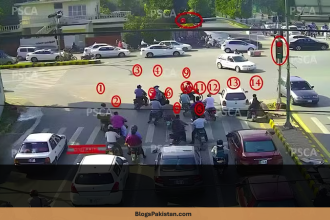The federal government of Pakistan has announced the establishment of 12 sector-specific working groups to drive the integration of Artificial Intelligence (AI) across the country’s development landscape. This initiative marks a significant step toward leveraging AI as a potent tool for national progress, with a focus on addressing pressing issues in various sectors such as education, health, agriculture, and more.
Setting the Stage: A National Strategy for AI
The decision was made during a meeting of the National Taskforce on Artificial Intelligence, chaired by Federal Minister for Planning Ahsan Iqbal. The meeting underscored the need for a comprehensive and inclusive national strategy for Artificial Intelligence integration, which will be developed in close collaboration with the Ministry of IT and Telecommunication. This strategy aims to position Artificial Intelligence not just as a technological advancement but as a strategic imperative for Pakistan’s national progress.
Minister Ahsan Iqbal highlighted the urgency of embracing Artificial Intelligence, stating, “In today’s world, AI is not just about technology; it’s about transformation. We must harness its potential to propel our nation forward.”
The Role of Sector-Specific Working Groups
To kickstart this ambitious initiative, 12 working groups will be formed, each specializing in different sectors including education, health, agriculture, climate change, business, and governance. These groups will consist of experts from the government, academia, and the private sector, tasked with preparing detailed roadmaps tailored to sector-specific needs. Their objectives will include setting timelines and resource frameworks to guide the effective application of Artificial Intelligence technologies.
By tapping into the diverse expertise of these groups, the government hopes to foster innovation and drive sustainable growth in each sector. The collaboration between public and private entities is expected to bridge knowledge gaps and accelerate Artificial Intelligence adoption across the board.
Financial Backing: The National AI Fund
Recognizing that financial constraints can hinder innovation, the government has approved the creation of a National AI Fund. This fund is designed to provide financial support to promising AI-driven pilot projects and innovative initiatives throughout the country. By doing so, the initiative aims to strengthen local capacities, reduce dependency on imported AI technologies, and foster a home-grown AI ecosystem.
The fund will be instrumental in nurturing startups and small businesses, allowing them to experiment with AI applications and contribute to the national development agenda.
Mapping Artificial Intelligence Talent and Resources
Another critical component of the initiative is the comprehensive mapping of AI talent and resources in Pakistan. This will encompass universities, research and development centers, and private enterprises. By creating an inventory of national expertise, the government aims to align resources with emerging technological demands and development challenges effectively.
This mapping exercise will help identify gaps and opportunities, ensuring that the country’s AI capabilities are fully utilized. It will also facilitate collaboration among various stakeholders, fostering an environment conducive to innovation and growth.
Key Stakeholders and Collaborative Efforts
The meeting was attended by a diverse group of stakeholders, including IT Minister Shaza Fatima Khawaja, Dr. Yasar Ayaz, Project Director of the National Center for Artificial Intelligence, senior officials from the Ministry of IT, NADRA, PASHA, and representatives of the Higher Education Commission (HEC), as well as private sector technology leaders.
The presence of such a wide array of participants underscores the collaborative nature of this initiative. By bringing together different sectors and expertise, the government aims to create a holistic approach to AI integration, ensuring that all voices are heard and considered.
National AI Workshop: Fostering Collaboration
In addition to the working groups, a National AI Workshop was announced, set to be organized in collaboration with PASHA and industry stakeholders. This workshop will serve as a platform for dialogue and collaboration, enabling stakeholders to share ideas, best practices, and insights on AI applications.
Through this workshop, the government aims to build a strong network of AI practitioners, researchers, and enthusiasts, fostering a community dedicated to advancing AI technologies for national development.
A Vision for the Future: Centers of Excellence and Quantum Valley Pakistan
As part of its broader vision for AI-driven national development, the government has already launched nine Centers of Excellence in emerging technologies. These centers are designed to be hubs of innovation, research, and development, driving advancements in AI and related fields.
Moreover, the Quantum Valley Pakistan project has been initiated to explore the potential of quantum computing and its applications. This forward-looking approach demonstrates the government’s commitment to staying at the forefront of technological innovation and ensuring that Pakistan remains competitive on the global stage.
Conclusion: A New Chapter for Pakistan
The establishment of sector-specific working groups for AI integration marks the beginning of a new chapter for Pakistan. By embracing AI technologies and fostering collaboration across sectors, the country is poised to achieve significant advancements in its development landscape.
With a strategic focus on innovation, capacity-building, and collaboration, Pakistan is well-positioned to harness the transformative power of AI and drive sustainable growth. As the nation embarks on this exciting journey, the world will be watching closely to see how AI will shape its future.










